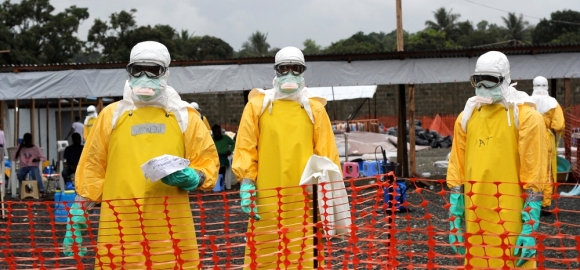
Doctors Without Borders staff at Ebola management center in Monrovia, Liberia. By Caitlin Ryan, Via MSF. Follow this link to donate to Doctors Without Borders.
The Ebola story has much in common with global environmental catastrophes such as the water crisis, food insecurity, and deforestation — “the terrorism of poverty,” is how Harvard Professor Paul Farmer characterized the crisis in a recent Washington Post article.
“There’s a reason the case fatality rate is 80 percent in rural Africa and 0 percent in Americans and Europeans who get out in time and get proper medical care,” Farmer said.
He said the world needs to bridge the “know-do gap,” the disconnect between what gets planned in conferences among elite global health leaders and what actually is happening on the front lines of medical care.
While many news accounts would have us believe the spread of Ebola is caused by the exchange of bodily fluids with West Africans, the current Esquire offers a more informed view from evolutionary biologist Paul Ewald of the University of Louisville:
Look at where it’s spreading, it’s in a place where they don’t have good infrastructure and health care. It’s in a place where they don’t have the basics of isolation and infection control. And so even though it has a very low infection rate, the conditions are so bad that it keeps smoldering along.
Last August, Voice of America reported on a conversation with Tulane University virus expert Dr. Daniel Bausch who explained Ebola’s causal relationship with poverty, deforestation and hunger:
Like the health systems, many people in Ebola-stricken regions lack the resources to get by. And that puts them at risk.
As they cut down forests for charcoal and to grow food, Bausch says they are driving the bats thought to carry the virus out into the open.
“With deforestation, bats that ordinarily would be foraging for fruit within fairly remote areas inside the forest now are forced to come out and look for fruit, for example, mango trees that may be in the proximity of humans and bring them closer to humans and have more of a chance of introduction of the virus,” said Bausch.
And poverty is also driving people deeper into the forest in search of food, including so-called “bushmeat,” which is known to carry the virus.
David Quamen, author of Ebola: The Natural and Human History, told National Geographic, “The primary factor is poverty”:
The severity of this outbreak in West Africa reflects not only the transmissibility of the disease, but also the sad circumstances of poverty and the chronic lack of medical care, infrastructure, and supplies. That’s really what this is telling us: that we need to try harder to imagine just what it’s like to be poor in Africa. One of the consequences of being poor in Africa, especially in a country like Liberia or Sierra Leone, which have gone through a lot of political turmoil and have weak governance and a shortage of medical resources, is that the current outbreak could turn into an epidemic.
As with environmental issues in the developing world, such as the childhood diarrhea epidemic caused by widespread water contamination, only direct intervention can prevent a downward spiral of poverty and public health. David Quamen:
It’s not just the toll directly from Ebola that is the tragedy. It’s the indirect toll too—the destruction of the economy and education, as well as the health care system. People are dying more of malaria and pneumonia and childhood diarrheal diseases because the health care system has been overwhelmed with Ebola.









